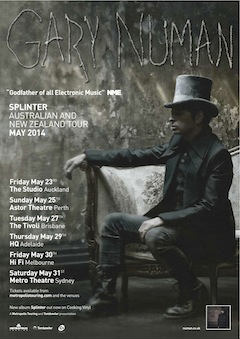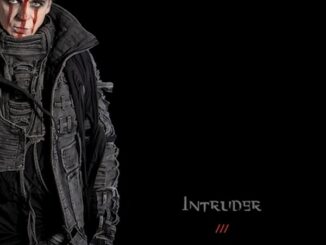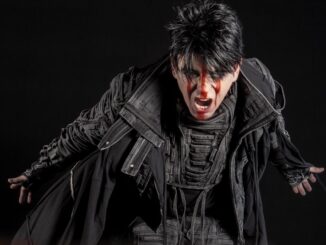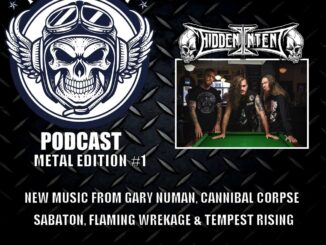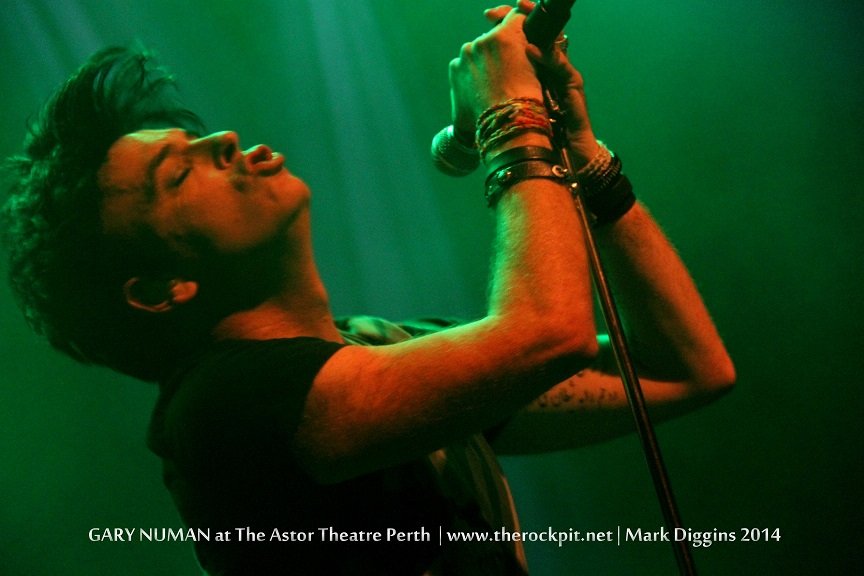
Gary Numan has been called the “Godfather of all Electronic Music” and over the years has inspired a huge range of artists from Trent Reznor to Prince to The Prodigy to Afrika Bambaataa to name a few. This month he is back in black and ready to darken Australia and New Zealand once again, and Paul got to ask him 20 questions!
1. First things first, how’s the tour going and what can we expect different this time when you come to Australia ?
So far we’ve toured the UK, Israel and much of Europe, two small US tours covering the West and East coasts and then a mammoth full North American tour so it’s already well travelled. After the Australian and New Zealand leg we go back to the UK for another two weeks there, then some summer festivals before ending the Splinter campaign in London in November. It’s all gone very well I’m glad to say. Splinter seems to have reached out not only to existing fans but to many new people as well. That may be due to the great reviews it’s had, as well as the music of course, but it’s meant that the live shows have seen a noticeable increase in energy and commitment from the crowds so, for me, it’s been a very exciting and rewarding experience.
2. When your choosing the set list for the shows, are you tempted to play a track that you may not have played for over 3 decades and maybe rework it a little now you have more technology at your disposal to play with ?
We constantly rework all the older songs that we play. Not so much that it ruins the experience for people that have looked forward to hearing those songs, but so that it keeps everything fresh and exciting for the fans and for us as a band. As well as the bigger, well known singles, I look for older songs that have some modern relevance. Songs like Metal and Down In The Park for example as they have been covered by Nine Inch Nails and Foo Fighters. Also songs that can be reworked in a far more powerful way. The more recent albums I’ve put out have been very heavy, aggressive things and so I need the older songs to mix with that without sounding old and dated. They need to be beefed up somewhat so that the set sounds like a cohesive thing and not something that alternates between now and retro every other song. I hate retro.
3. Do you like to be in full control of the tour when it comes to lighting/sounds/support acts ?
I’m reasonably hands on yes. I don’t like to stand there like a domineering ogre but it is important that all the pieces are working together. The lighting and sound are obviously very important. Support acts I often pick myself, but sometimes I will bow to the knowledge of local promoters. It depends on how well I know the local music scene.
4. What has been your favourite tour over the last decade and why? (for me it was ‘The Hope Bleeds’ Tour, I was at the Manchester show, that show was later released as a live DVD, if I remember right).
Splinter has been my favourite by a thousand miles. The crowd reactions on this tour have been far and above more exciting overall than other tours. Not that they were poor crowds, far from it, but Splinter crowds seem to have an energy that wasn’t as obvious before. Some songs have quiet sections and you can gauge how the crowd are reacting in those moments. If you hear nothing, it’s a watcher crowd, if you hear shouts and screams, whistles and cheers, it’s a very reactive crowd. We love those, so we always listen out in those quiet moments.
5. The new album ‘Splinter’ has been received well by the fans and media alike can you tell us a little about the recording process for this album and how did it differ from ‘Jagged?’
Not much of a ‘process’ to talk about really just a basic nuts and bolts working practice. I sit down on a Monday morning and, using a piano or a synth that sounds like a piano, I write a melody and basic arrangement. The next day I start to build the production into the song and build the layers. Wednesday that will continue usually. On Thursday I will record a rough guide vocal, and any backing vocal parts, without proper words, just singing noises that sound like words, until I get the flow and phrasing exactly the way I want it, and then I start on the lyrics. Friday I will check, or finish off, the lyrics and record the final vocal. Then a rough mix and it’s sent off to Ade Fenton, my producer, who tends to erase most of it and rebuild it with his own ideas. Then we argue and eventually meet somewhere in the middle. Not every song goes like that of course but that’s pretty much what I’m aiming for.
It’s all very high tech, computers and software rule and as I’m in Los Angeles and Ade is in the UK we very rarely sit down together to work on things. It’s all done by exchanging files and working in isolation. Sounds a bit odd but it works really well.
6. Where did the concept come from for ‘Splinters’ CD cover ?
I was sent a link to a web site to listen to the music they were using as a background. It was Azam Ali and I promptly bought every album she’s ever made, amazing stuff. Anyway, the web site was for photographer called the Roach Brothers and I noticed how cool the photos were while I was listening to the music. They were all old fashioned and very stylised and I thought it would really suit Splinter. I came up with a Victorian style image and flew to England for a photo shoot and we got some great results. The artwork was put together back in Los Angeles where I worked on it with Josh Giroux who did an amazing job. The connection to the album is vague I’m afraid. I wish I could give you a clear reason for why it looks the way it does and why that look connects with the album, but I can’t. Two of the songs are ideas taken from a novel I’m trying to write and the cover look is from a character in that book so a tenuous connection to the album at best.
7. Is there a song on the album you are most proud of and a favourite of yours?
Actually no. Most albums have obvious high points and, if truth be told, a few tracks that are making up the numbers. But, with Splinter, that isn’t true at all. I honestly can say that it doesn’t have one single song that doesn’t deserve to be there and I cannot pick out one as being clearly better than any other. It’s the most consistent album I’ve ever made. In a live situation some are more aggressive than others so they are more exciting to perform, Love Hurt Bleed would be one of them, but Lost also works well live but in a very different way. Lost is gentle and haunting so it depends somewhat on what mood I’m in I guess.
8. How have the songs been received live by the fans?
Splinter has had the best fan response of any album I can remember. The feedback has been incredible, just incredible, and I can’t tell you what a relief that has been. Splinter came after a seven year gap from the last studio album proper (although I did record a side project album with Ade called Dead Son Rising in 2011) and with a gap that long you begin to worry that the album, no matter how good, will never be good enough to meet the building expectations for it. The longer the wait, the worse it gets. So, I’ve been totally blown away by the fan reaction. I couldn’t have asked for anything better.
9. A lot of people still see you as Gary Numan – the guy from the early 80s that had a hit’s with ‘Cars’ and ’Are Friends Electric,’ has that fan base followed you and how have they taken to your new style of music?
Well I’ve been making this kind of music since 1994 so they’ve had plenty of time to adapt to it or move away. I know some of them have followed me but it’s hard to know for sure how many. I seem to be picking up new people all the time so you can’t tell just by looking at sales who is new and who has been there for a while. From what I can see those fans that go back a way seem to love the new album, but I guess there could be many that don’t and so have drifted away. My concern isn’t really about keeping people though, it’s about making music that I love, that I’m excited by and passionate about. Having done that of course I hope as many people like it as possible but I don’t make it for them, I make it for me.
10. What influence has Ade Fenton had on your musical style?
He does an amazing job of polishing the raw diamonds I give him 🙂 He’s a very clever man, very creative, very technical. The style is already there though. Luckily we have very similar tastes in music so we are always heading in the same general direction, musically speaking.
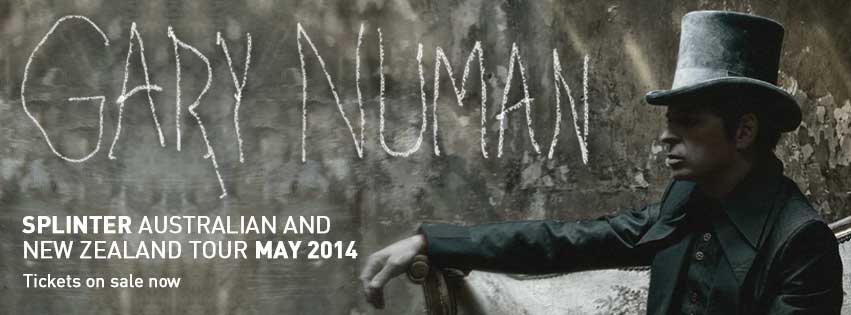
11. Do you envisage yourself doing a more guitar orientated album in the style of the ‘Pure’ album?
Who knows? I love the Pure album but for the time being I’m very much back in the heavy electronic camp. I tend not to plan too far ahead these days. Once the Splinter campaign is over I will go back into the studio and start to write and I will see what happens and how things feel at that time. If my current thinking is anything to go by it could be even more electronic than Splinter but, as I say, who knows what I’ll be thinking in a few months.
12. Your music has been described as Industrial/Gothic rock and has paved the way for many bands that model themselves on you just like way back in the 80s, are you surprised that you are still setting trends and are you flattered by it?
I’m very flattered by it. It’s a very cool thing to have been an influence on even one generation of musicians, but to be so again is amazing. I’m very proud of that. I have never given myself to the nostalgia scene though. I have always tried to push forward with each new album, never sitting back and relying on past glories to milk out the remains of my career. I have always been fascinated and excited by new technology and what we can do with it musically, and outside of music in many ways. I am still far more interested in what I’m going to do tomorrow than what I did even yesterday, let alone thirty five years ago. Perhaps that’s why other musicians are still drawn to what I’m doing.
13. What bands and music are you listening to at the moment and are there any that have caught your eye?
A few actually. The three bands that I’m most into at the moment are called Roman Remains, who supported me on my recent North American tour, and two UK bands, one called Officers, whose new album is nearly ready, and another called The Losers who are currently on tour in Germany I believe. I’m also a recent convert to Big Black Delta who I saw a lot when they also supported me.
14. In the past you have worked with other artist’s like ‘Fear Factory’ and‘Nine Inch Nails’ is there anyone alive or dead that you would like or have liked to work with?
I would have loved to have worked with Marc Bolan. T-Rex were my favourite band when I was growing up. It was hearing T-Rex that made me decide that I wanted to be in a band and make music, Marc Bolan shaped my entire life in a way.
15. Is there any truth in the rumour that your working and making music with Trent Reznor from ‘Nine Inch Nails?’
We’ve talked about doing something together a number of times but it hasn’t happened yet. I’ve been on stage with NIN many times but no studio work so far. I do live in LA now, in fact Trent lives about twenty minutes from my house, so that should make it a little more likely in the coming years. We shall see. He’s constantly busy, as am I, so it’s finding the time as much as anything.
16. When you are off tour and not recording, how do you like to spend your free time?
I have three small children so I don’t get free time. I get work time and family time. Of the two family time is, by far, the more hectic and stressful. Kids have a way of touching nerves that ordinary human beings never reach, both good and bad. We do a lot of things as a family though so even my days off are full on. I used to fly World War Two aeroplanes. For many years I was an aerobatic display pilot, flying at air shows all over Europe. Most of my friends were killed in various accidents though so, when the children came along, I decided that it was too reckless a thing to do as a hobby and I pulled out. I’m missed it ever since. It was the most exciting, and dangerous, thing I’ve ever done.
17. You have recently moved to America, how has the move been for you and your family? and why the move after spending so much of your life in England?
The reasons for moving were many but include weather (obviously) and a desire to work more in film and TV music. I also think that there are more opportunities for women in the US than in the UK and, as all my children are girls, that was an important factor. Also, my wife Gemma has wanted to live in the US since she was an embryo so I had that gentle but insistent daily pressure to move. I’m glad we did. Life here is on a completely different level to the UK. It may not suit everyone of course, so I’m not saying that the US is better than the UK, I’m not taking sides, but for me, I’ve never been happier.
18. If you had the chance to change anything about your career over the last 30 years, what would it be and why ?
The number of things I’ve done wrong over the years would make an amazing catalogue of poor decisions. It’s a genuine miracle that I still have a career, and that it’s still thriving. I have handled my career, until recently, with a clumsy hand and I have done myself few favours. Thank fuck I can write songs because, so many times, it’s all come back to that one skill. So, I would change many, many things. Too many to mention.
19. At the Rockpit we have to question we ask everyone we interview, Is there one album or song you could have recorded or been part of what would it be and why?
I would love to have been around when Alan Wilder was working on the Depeche Mode ‘Songs Of Faith And Devotion’ album. I love that album and I think Alan is a genius. To have been a part of that process would have been amazing.
20. And the last question is what is your take on the meaning of life ?
It’s all pretty meaningless actually. I see no reason for it whatsoever as a contribution to the Universe. As for me, just have as much fun as possible without hurting anybody.
